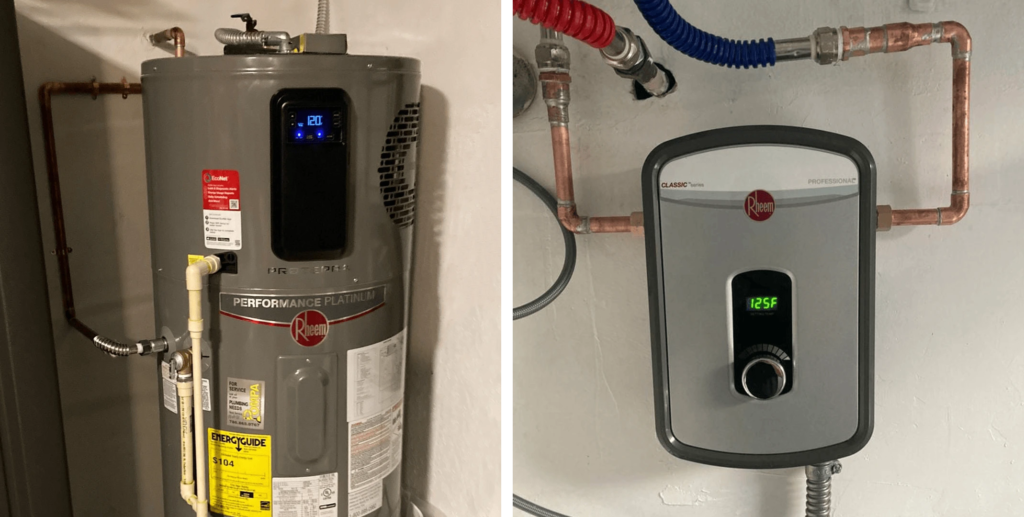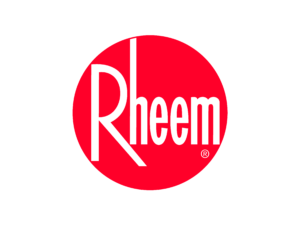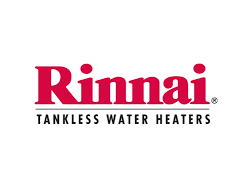Tankless vs. Traditional Water Heaters: Which One is Right for You?
August 11, 2023

Traditional Water Heaters
Traditional water heaters, often referred to as storage water heaters, have been the backbone of residential and commercial water heating for decades. These appliances consist of a large tank that stores and heats water, ensuring it’s readily available whenever needed. The concept is simple and reliable, making it a staple in many households.
Benefits of Traditional Water Heaters:
Initial Cost: One of the primary advantages of traditional water heaters is their affordability. The upfront cost for purchasing and installing a traditional unit is generally lower than that of a tankless model. This can be especially appealing for homeowners and business owners on a budget.
Familiarity: Traditional water heaters are a well-established technology, which means they’re widely understood by homeowners and professionals alike. Maintenance and repairs are often straightforward, and parts are generally readily available.
Steady Flow: Traditional water heaters offer a consistent flow of hot water. The storage tank ensures that a supply of hot water is always on hand, making them suitable for homes with high hot water demands.
Considerations for Traditional Water Heaters:
Energy Efficiency: Traditional water heaters have a standby heat loss issue. As the water in the tank constantly needs to be kept at the desired temperature, energy can be wasted even when hot water isn’t being used.
Space Requirements: The sizeable tank of a traditional water heater can be space-consuming. This can pose a challenge, particularly in smaller homes or businesses with limited storage space.
Tankless Water Heaters
Tankless water heaters, also known as on-demand water heaters, have gained traction in recent years for their energy-efficient and space-saving attributes. Unlike their traditional counterparts, tankless units heat water only when it’s needed, eliminating the need for a storage tank.
Benefits of Tankless Water Heaters:
Energy Efficiency: Tankless water heaters shine in energy efficiency. They only heat water on demand, reducing standby heat loss. This can result in significant energy savings over time, translating to lower utility bills.
Endless Hot Water: Tankless units provide a continuous supply of hot water. With no storage tank to empty, you can enjoy long showers and multiple hot water tasks without running out.
Space Savings: One of the most remarkable features of tankless water heaters is their compact size. They can be mounted on walls, freeing up valuable floor space. This makes them ideal for apartments, small homes, and commercial settings where space is at a premium.
Considerations for Tankless Water Heaters:
Initial Cost: The initial investment for a tankless water heater, including installation, tends to be higher than that of traditional models. However, the long-term energy savings can help offset this cost over time.
Installation Complexity: Installing a tankless water heater may require modifications to your plumbing and gas lines. It’s recommended to hire a professional for installation to ensure safety and proper functioning.

Rheem: A Trusted Name in Water Heater Brands
Rheem is a renowned brand in the water heating industry, offering a diverse range of traditional and tankless water heaters. With a history dating back to the 1920s, Rheem has built a reputation for reliability and innovation.
Traditional Rheem Water Heaters:
Rheem’s traditional water heaters are built with durability in mind. They come in various sizes to accommodate different hot water needs and offer straightforward operation and maintenance.
Rheem Tankless Water Heaters:
Rheem’s tankless water heaters exemplify the brand’s commitment to efficiency. Equipped with advanced technology, these units provide precise temperature control and energy savings. Rheem offers both indoor and outdoor installation options to suit various settings.

Rinnai: Pioneering Tankless Water Heating
Rinnai has been a trailblazer in the tankless water heating sector. The brand is synonymous with innovation and cutting-edge technology, delivering products that redefine how we think about hot water supply.
Rinnai Tankless Water Heaters:
Rinnai’s tankless water heaters boast impressive efficiency ratings and a reputation for reliability. With a focus on precision engineering, Rinnai units deliver consistent and comfortable hot water, adapting to different flow rates and temperature preferences.
Making the Right Choice
Selecting between a tankless and traditional water heater boils down to your specific requirements and preferences. Here are a few key factors to consider when making your decision:
Hot Water Demand: Assess your household or business’s hot water needs. Larger families or establishments with high hot water usage may benefit from the continuous supply offered by tankless units.
Energy Efficiency: If energy savings are a priority and you’re willing to invest upfront for long-term benefits, a tankless water heater might be the better choice.
Space Availability: If space is limited, a tankless water heater’s compact design can be a game-changer.
Budget: Consider your initial budget and how it aligns with the long-term savings and benefits each type of water heater offers.
In conclusion, the choice between tankless and traditional water heaters depends on your unique circumstances and priorities. Rheem and Rinnai stand as reputable brands within their respective categories, offering a range of options to cater to your needs. Whether you value energy efficiency, consistent hot water, or space savings, a careful evaluation of these factors will guide you toward the water heating solution that’s perfect for your home or business.


